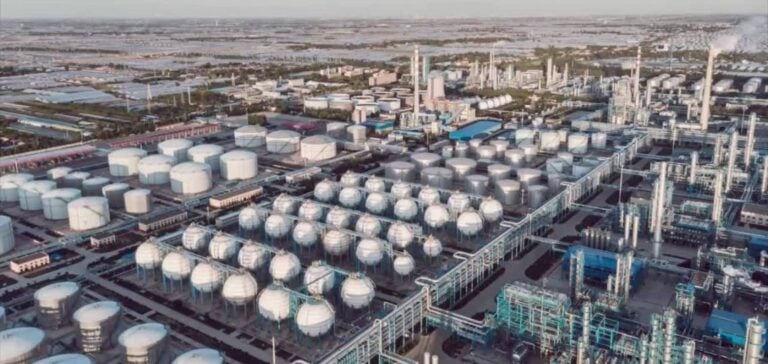Independent refineries in Shandong, China, are bracing themselves for a potential shortage of raw materials in the fourth quarter, as they approach the exhaustion of their crude oil import quotas . This situation is exacerbated by a change in consumption tax rules, which is expected to increase the cost of alternative raw materials.
From October 1, refineries will face a heavier tax burden on fuel oil and bitumen blend, which could have a significant impact on their refining margins and profitability.
Independent refineries, which account for around 18% of China’s total refining capacity, rely heavily on fuel oil and bitumen blend to produce refined products such as diesel and gasoline.
Currently, these refineries have a capacity of 3.4 million barrels per day.
New tax regulations, which limit the possibility of deducting consumption tax on fuel oil, could make the use of these raw materials economically unviable.
A refinery manager said, “The economics of using fuel oil and bitumen blend as feedstocks may no longer exist if these tax regulations are strictly enforced.”
Impact of new tax regulations
Independent refineries, which until now have been able to offset the consumption tax on fuel oil against the tax paid on refined products, will now have to bear a significant proportion of this tax.
Currently, the consumption tax on fuel oil is 1.2 yuan per liter, but with the new rules, refineries will only be able to offset 60% of this tax, which will increase their processing costs.
Another official added that “processing costs for fuel oil and bitumen blend will rise, which could force refineries to reduce their imports of these grades.”
Refineries without crude import quotas are in an even more precarious situation.
They have no viable raw material alternatives, which could force them to cut production.
Refining margins, which were already under pressure, could be further affected by the new regulations.
Data show that refining margins for processing imported crudes were around 206 yuan per tonne in August, but the profitability of independent refineries is becoming increasingly difficult to maintain.
Impact on imports and quotas
Shandong’s independent refineries imported 9.36 million tonnes of fuel oil in the first eight months of the year, stable on the previous year.
However, bitumen blend imports fell by 29.8% to 6.07 million tonnes.
These two products account for around 20% of total raw materials imports.
If refineries are unable to find economically viable alternative feedstocks, they may be forced to rely on crude imports, which would quickly exhaust their import quotas.
Currently, qualified refineries in China have imported a total of 61.31 million tonnes of crude, leaving only 25.11 million tonnes of quota for the rest of the year.
One analyst noted that there is a shortfall of over 5.5 million tonnes of crude import quotas for the rest of the year.
This raises concerns about refineries’ ability to maintain operating rates in the fourth quarter, especially if new tax rules result in higher processing costs.
Outlook for the future
The challenges facing Shandong’s independent refineries could prompt the government to allocate crude import quotas for 2025 earlier than planned.
This could offer some respite to refineries struggling to adapt to the new tax regulations.
However, the situation remains uncertain, and refineries will have to navigate an environment of increased costs and limited raw material availability.
Industry experts question the long-term viability of these refineries in the face of already tight refining margins and changing tax regulations.
The adjustments needed to meet these challenges could also influence international oil flows to China. Independent refineries play a crucial role in balancing the domestic market and crude imports.
Decisions taken by these refineries in the coming months will have repercussions not only on their own profitability, but also on the Chinese oil sector as a whole.






















